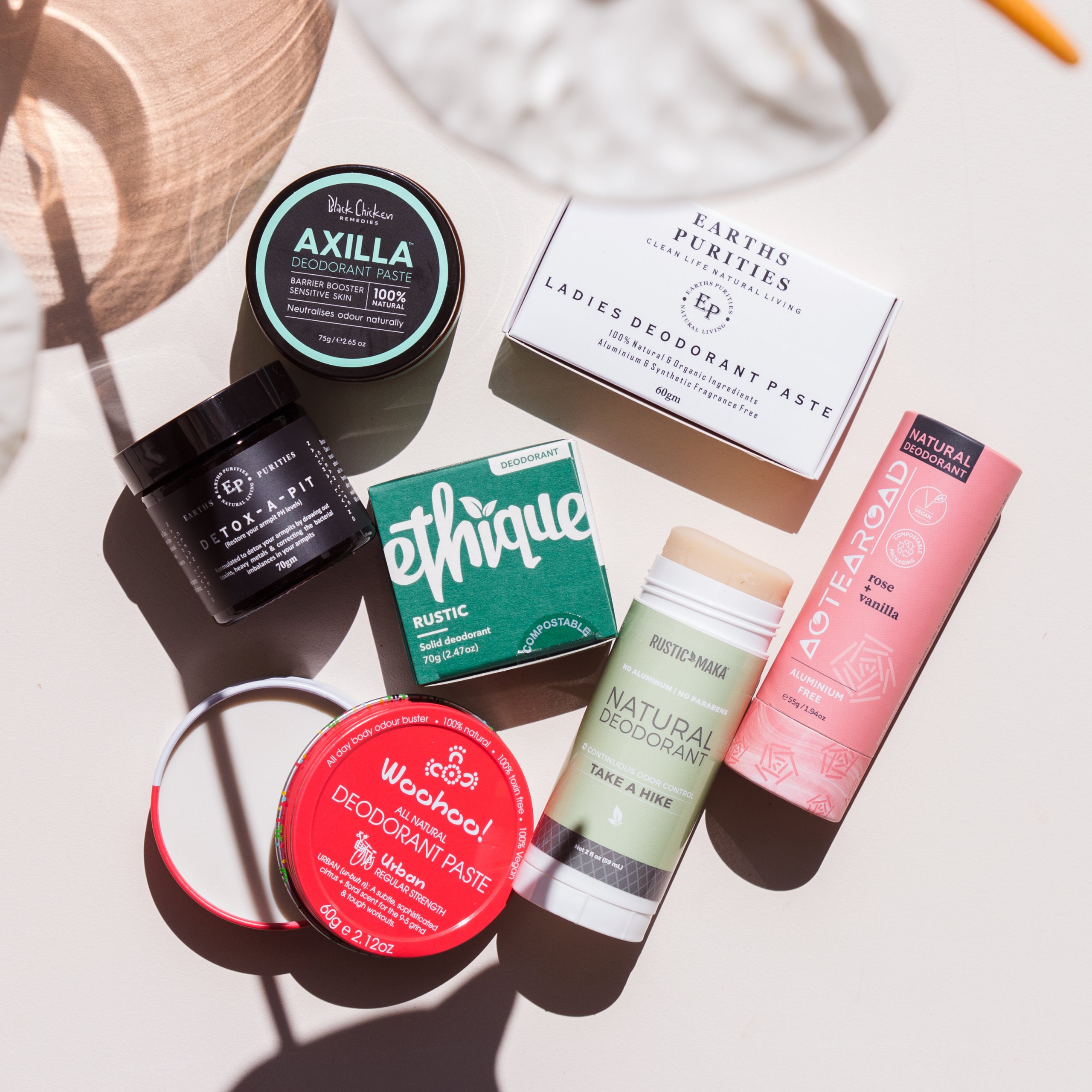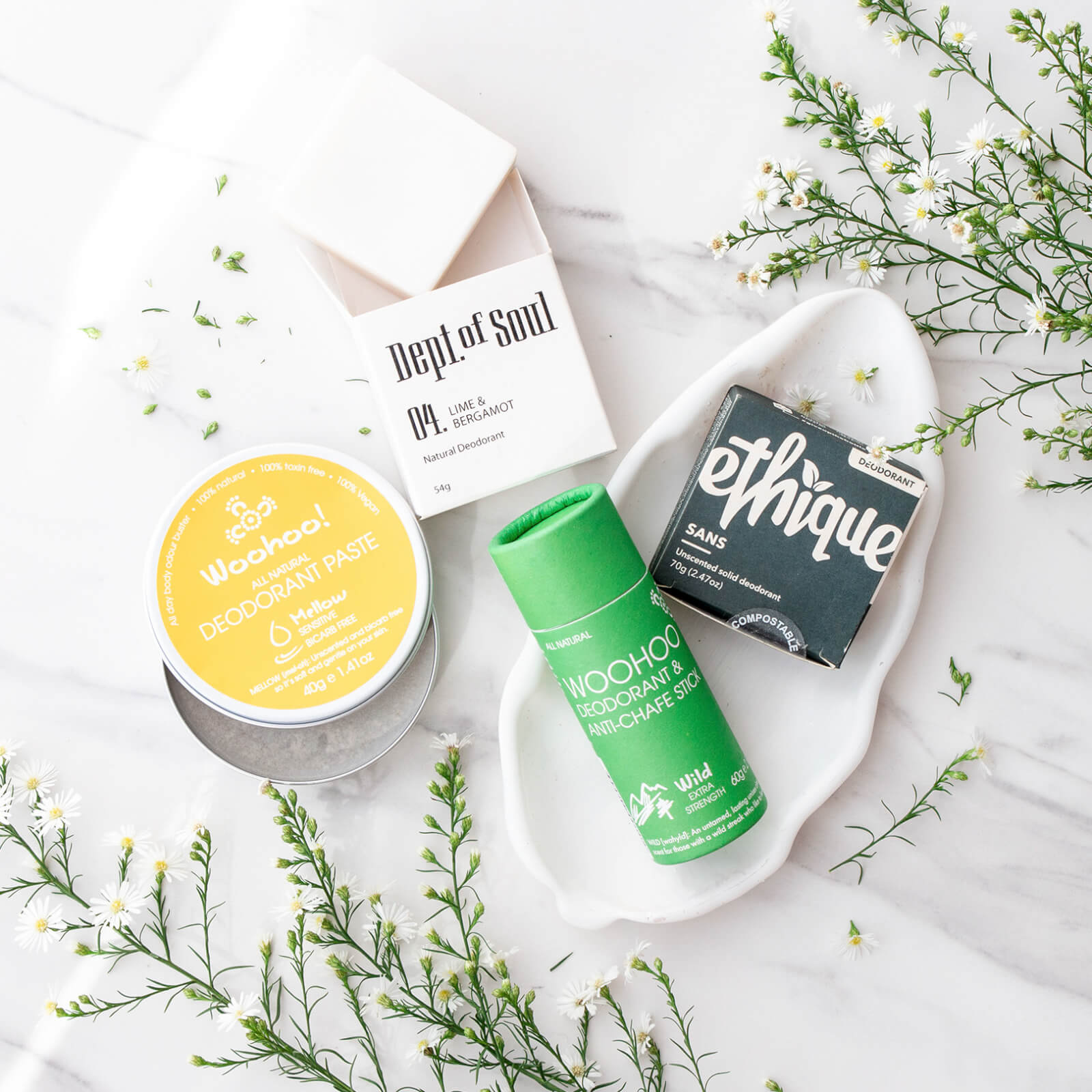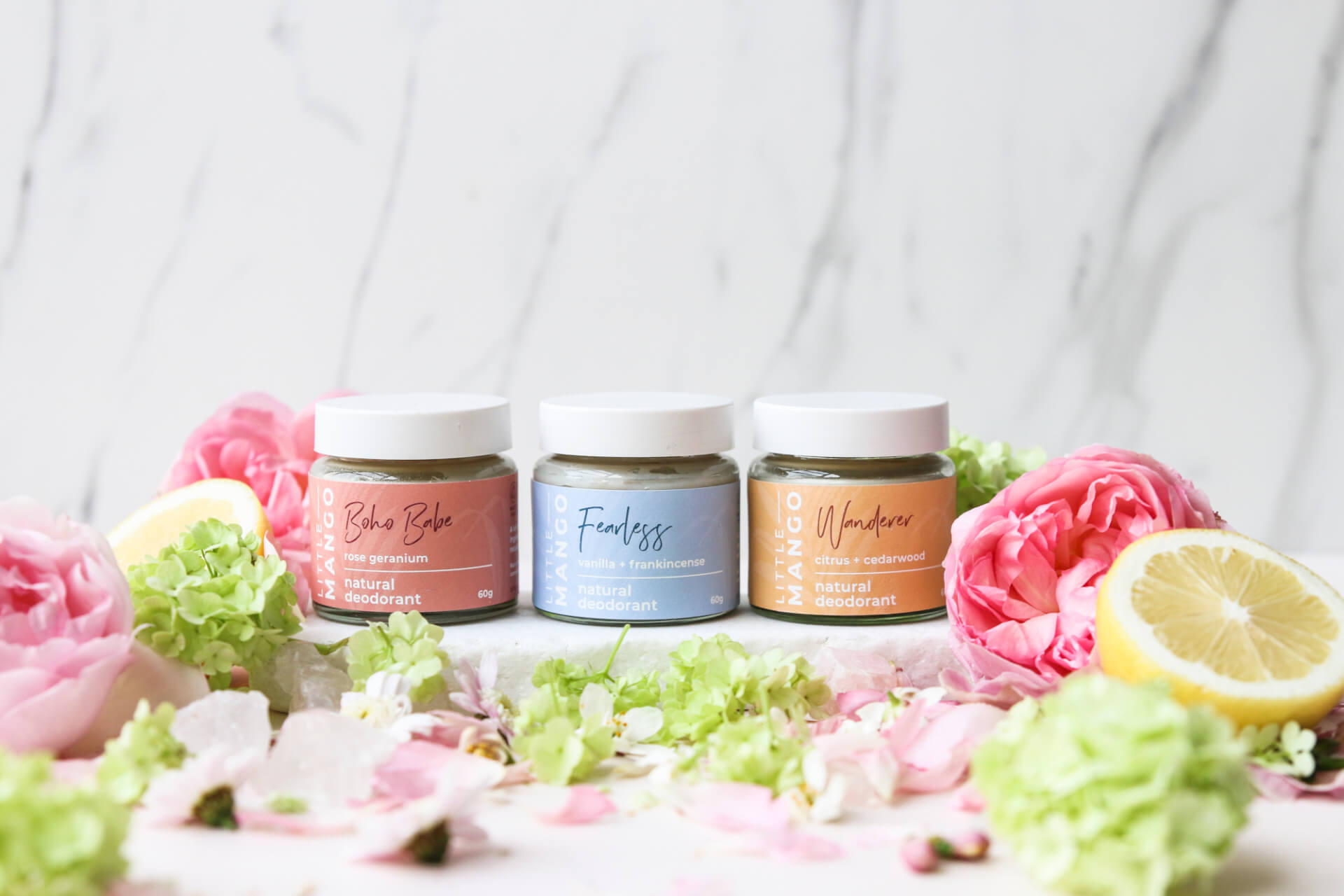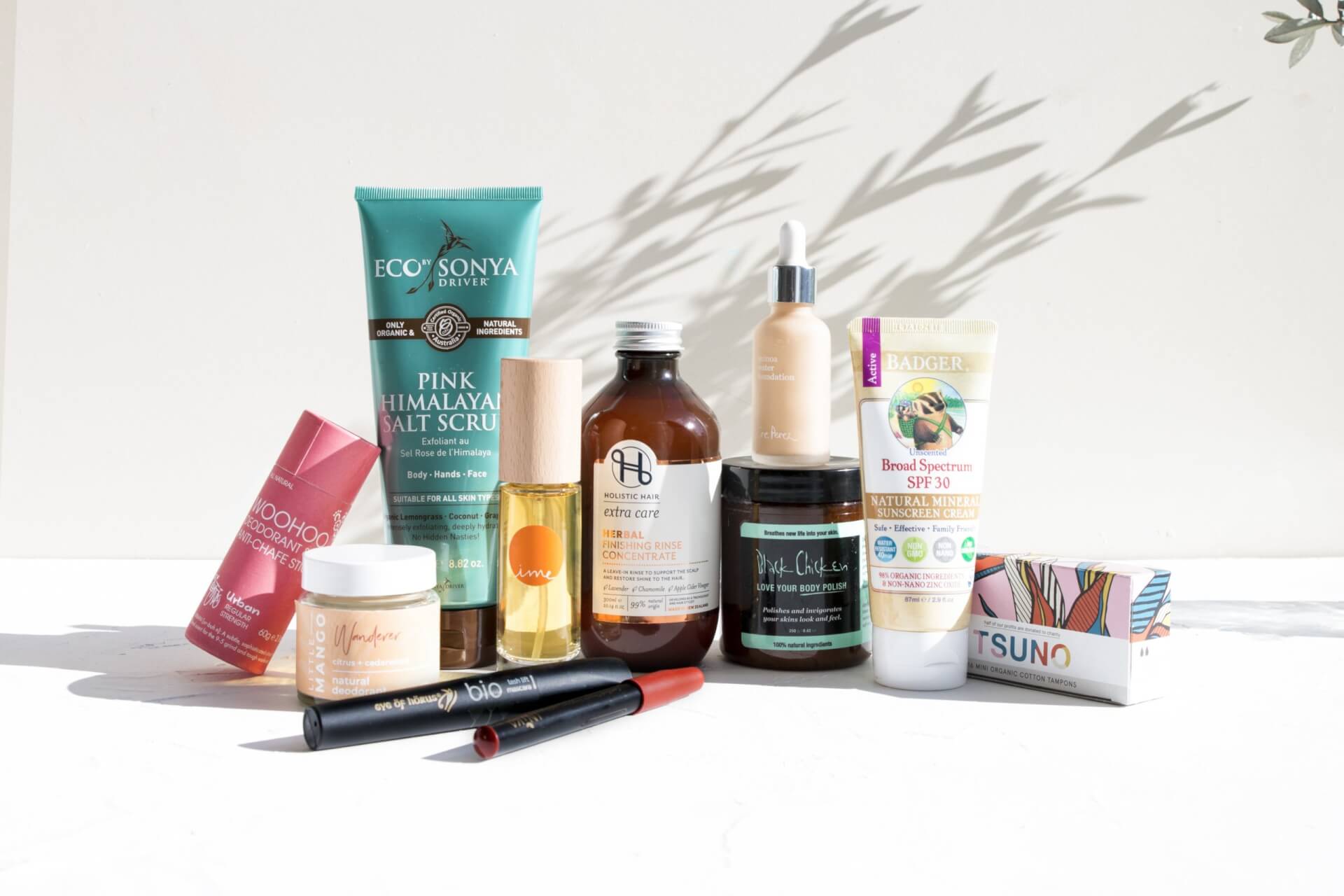Deodorants, Lifestyle, Product Reviews, Sustainability, Waste free, Words from Juliet Dale - The Great Eco Journey
Juliet from The Great Eco Journey – I Tried 13 Natural Deodorants & This is What I Learnt…
Written by Juliet Dale from The Great Eco Journey
I was naïve going into this. For years, the topic I have most frequently been asked about is natural deodorants. So I thought, ‘I’ll solve this once and for all! I, and others, will trial ALL the natural deodorants out there, and find out which ones work best! We will call it… THE GREAT DEO TRIALS!’. So I recruited 10 testers, collected and distributed samples from 13 different brands, and away we went. But then, the results started coming in, and that’s when I realised how naïve I had been.
For the first deodorant being tested, tester #1 thought the fragrance was “gorgeous” and loved how easy it was to apply. The second tester didn’t like the fragrance, found it “sore to apply”, and was left with a painful skin irritation. The third tester said “this was a deodorant that really worked!” and the fourth tester loved the packaging, but said, “I found it ineffective for me, and experienced a lot of body odour”. “Yikes!” I thought to myself, “what am I meant to do with this information?”
The trials continued for three months (each deodorant tested for two weeks, by 5 testers), and the results continued in this vein. Every deodorant had testers that loved it, and testers who really didn’t. I found myself wondering if the whole thing was a waste of time. But with about five deodorants done, things began clicking into place in my mind. I was not going to have a clear ‘winner’ or even ‘top 5’, but the information that I was gathering was giving me priceless evidence into how natural deodorants actually work, how our different bodies impact the effectiveness and how personal preference plays a big part in natural deodorant choice. By the time the trial was finished, I had come to five very clear learnings, and I’m excited to share them with you!
1. LET’S TALK ABOUT SWEAT BABY!
The first thing that you need to know is that natural deodorants are not antiperspirants. Antiperspirants work by using aluminium salts to temporarily block your sweat glands – therefore stopping you from sweating. So how do natural deodorants work? Natural deodorants aim to neutralise odours and discourage bacteria from lingering on your body. It is these bacteria that cause bad odours, as the bacteria eat the sweat (yummy!) and then excrete it on your skin (again, yummy!). Not all bacteria excretions are smelly, so it depends on the microbial makeup of your skin as to whether you are lucky enough to have bacteria that don’t have smelly excretions, or if you have lots of the stink-causing ones. It is also these differences in our microbial makeups that result in the differences in the effectiveness of natural deodorants. It is impossible to make a natural deodorant that will discourage all types of bacteria, hence why no natural deodorant will suit everyone. THAT’S why the results in The Great Deo Trials varied so much. Probably the biggest recommendation that I have from these trials is to make the most of any tester/sample size products that brands offer, and to the brands who don’t offer them: please do! No one wants to invest in a full-size product and then find it doesn’t work for them. The great news is though, that natural deodorants do work. Nine of the ten testers are happily sticking with natural deodorants. The final tester, who suffers from hyperhidrosis – or excessive sweating – decided that anti-perspirant is best for her.
2. MAKING THE CHANGE
You may have heard talk of ‘detoxing’ your armpits or the ‘transition period’. When changing from an antiperspirant to a deodorant, some people DO smell more for a period of time (generally up to two weeks). Why does this happen? As I mentioned in the previous point, when you stop using an antiperspirant you start to sweat more. Sweat itself does not smell – again, it is the bacterial excretions from those bacteria on your skin that do. Studies have shown that those who have used anti-perspirant deodorant for a long time, and then stop, have higher amounts of stink-causing bacteria. This is believed to be because the aluminium salts in the antiperspirants help certain types of stink-causing bacteria to thrive – but this didn’t impact you at the time, because the stink-causing bacteria had no sweat to munch on, and therefore were not creating the smelly excretions. Now that the sweat is back, the stink-causing bacteria are going nuts, feasting on your sweat and excreting up a storm – hence the smell!! BUT, as you continue using a deodorant, the populations of bacteria on your skin will begin to change, and those stink-causing bacteria that loved the antiperspirant, will (hopefully!) decrease, along with the smell. Unfortunately, there is no way to know if this ‘transition’ period will happen for you. Personally, I didn’t experience it, but I have friends who have. The best ways to deal with it is to have a really good level of hygiene, give your armpits a scrub a couple of times a week to help speed up the process, and apply your new deodorant a couple of times per day. *
Ok, I’m done talking about bacteria munching on sweat and excreting on your skin! Onto the next, more palatable point…
3. FRAGRANCE
Natural deodorants tend to have mild fragrances that aren’t particularly long-lasting. There’s a good reason for this: they are not synthetic. Historically, companies have never had to disclose what ingredients their ‘fragrance’ is made from. Back in the day, this was to protect perfumery’s ‘trade secret’ recipes and blends of essential oils. Now, however, it means that the hundreds of ingredients making up synthetic fragrances are unknown to the consumer. Some common synthetic fragrance ingredients include petrochemicals, synthetic musks and phthalates. I don’t know about you, but I’d prefer a mild fragrance!
4. SENSITIVE SKIN
This is another common barrier to natural deodorants, as many contain baking soda, which can cause irritations for those with sensitive skin. The great news is that there are brands out there who are NOT using baking soda, or who provide a baking soda free alternative. All the issues with skin irritations in the trial were from deodorants with baking soda, but interestingly, some of the brands that DO contain baking soda didn’t cause any irritation, even for those who had sensitive skin. It is worth shopping around a bit, and not completely eliminating baking soda from your options.
5. APPLICATION METHOD / PACKAGING
This was a real point of contention for our testers! Traditionally, antiperspirant deodorants come packaged in spray or roll-on style packaging. However, these styles don’t generally work for the consistency of natural deodorants – so there are two main types of packaging used: jars/tins with a cream textured deodorant, or cardboard tubes with a stick deodorant. As well as those, we also had a deodorant bar, that came in a cardboard box, a pouch (similar to a yoghurt sucky) and a final brand that offered both a spray in a glass bottle or a plastic roll-on (made from mostly recycled plastic).
I was utterly blown away by how divided the testers were, and it just went to show how personal preference plays a big part in which deodorant is right for you! Their strong opinions were based on two key things: how reusable/recyclable/compostable the packaging was, and secondly, how easy/difficult they found it to apply.
With the jars/tins, those in favour liked that it was both reusable and recyclable. They liked this method of application, in particular, that they could warm the cream/paste up in their fingers to soften it a little, and also the pampering moment of massaging their armpits! But the haters couldn’t stand getting the deodorant on their fingers and were annoyed by the time and water required to wash their hands afterwards.
The tube fans liked that the packaging was completely home compostable. They found the tubes easy, convenient and mess-free to apply. However, the other camp found they could tug a little, be too solid, and be a bit painful on their armpits.
The deodorant bar was also popular for its completely compostable packaging. The plastic pouch didn’t really win the testers over, despite it being easy to apply, and a packaging recycling scheme offered by the brand. No one liked the idea of sending the plastic roll on to landfill, even if it was made of recycled plastic, but the glass bottle spray was quite popular, and the testers thought they could probably reuse the bottles, or recycle them.
I went into this experience thinking I’d be able to tell you what deodorant would work for you, but instead, I’m telling you about sweat-munching bacteria and their excretions! The biggest thing I took from The Great Deo Trials, is that we are all so different, and what works for one person, may not work for another. There will likely be some trial and error involved in finding the right natural deodorant for you, but it’s worth it.
Natural deodorants DO work, and, luckily, there are a lot of awesome brands out there! I’m so grateful to all of the brands who participated in the trial – for doing what they do, and for putting themselves out there. Each and every deodorant had testers who loved it.
TRIAL TESTER FEEDBACK
I’m going to give the final words to a few of the wonderful testers from the trial – this was their overall conclusion on natural deodorants.
Note: Some names have been changed
Harley – “Many work just as well if not better than non-natural deodorants. Before this trial, I felt like I had barely any options and if I wanted something natural and cruelty-free I’d have to suffer for it by dealing with body odour. Turns out I was just trying the wrong ones and there are now multiple that work for me!”
Jaz – “A misconception I had is that I had to put up with being a bit more ‘smelly’ wearing a natural deodorant and it’s just not the case.”
Tessa – “Most of them work but if you want to find your perfect match it really depends on your specific needs.”
Kate – “I don’t react as badly as I thought I would, some actually worked, and some even with hairy armpits!”
Gemma – “They really do work just as well, if not better than normal deodorants, but they tick all of the ethical boxes.”
Oh Natural have a great range of Natural Deodorant’s that really do work including waste free and sensitive skin options for both men & women and many that come in sample sizes for you to try them out.
Check out the customer reviews to help you decide which one is right for you and once you’ve tried them, you can earn rewards points by leaving a review!
References: *This fantastic video by Brianne West, founder of Ethique explains the transition period from antiperspirant to deodorant








